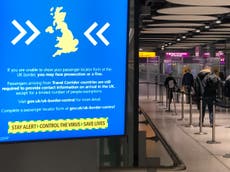Coronavirus: Christmas surge in infections will delay vaccinations, public warned
'It's not possible to run vaccination clinics when staff are off sick and there's a very high transmission rate’
Your support helps us to tell the story
From reproductive rights to climate change to Big Tech, The Independent is on the ground when the story is developing. Whether it's investigating the financials of Elon Musk's pro-Trump PAC or producing our latest documentary, 'The A Word', which shines a light on the American women fighting for reproductive rights, we know how important it is to parse out the facts from the messaging.
At such a critical moment in US history, we need reporters on the ground. Your donation allows us to keep sending journalists to speak to both sides of the story.
The Independent is trusted by Americans across the entire political spectrum. And unlike many other quality news outlets, we choose not to lock Americans out of our reporting and analysis with paywalls. We believe quality journalism should be available to everyone, paid for by those who can afford it.
Your support makes all the difference.Vaccinations to protect against Covid-19 will have to be delayed if the Christmas “amnesty” triggers a surge in infections, the head of the Oxford programme has warned.
Restrictions will be relaxed for five days over the festive period – and Tory MPs are piling pressure on the government to allow some areas to escape to a lower tier this week.
But Sarah Gilbert, from the Oxford Vaccine Development Programme, pointed to the grim experience in the United States, now experiencing 3,000 daily deaths after the Thanksgiving celebrations.
“If we have that kind of thing happening over the Christmas holidays in this country, with very high transmission rates then possible in January, it's going to take so much longer to get things back to normal,” she warned.
“Because, partly, all the vaccination clinics will be disrupted. It's not possible to run vaccination clinics when staff are off sick and there's a very high transmission rate affecting people's ability to come to be vaccinated.
“So, I think what we do over the next few weeks is really going to have a big impact on how long it's going to take to get back to the normal.”
Speaking to the BBC’s The Andrew Marr Show, Professor Gilbert added: “Hopefully we could be more or less back to normal by the summer, but that's not going to be possible if we're starting from a very bad position in January.”
Although tens of thousands of people have received jabs in the last week, the vast majority will not do until next year – with the aim of vaccinating everyone in the most-at-risk groups by Easter.
Until that happens, most of England is likely to remain in the toughest top two tiers of the restrictions, with no indoor mixing of households allowed.
However, Dominic Raab, the foreign secretary, insisted there would be no rethink of the Christmas easing of curbs, despite the fears of a third wave of coronavirus cases.
“It has been a really tough year all round. Everyone’s felt it, people do need that five-day window over Christmas to spend a bit of time with their loved ones from a mental health level and emotional level,” he told Sky News.
Ahead of Wednesday’s review of which area is in which tier, Mr Raab also warned: “Hopefully, some can come down – but if necessary, others can go up the tiered approach.”
Asked if the Oxford/AstraZeneca jab, if approved by the UK’s regulator, could eradicate coronavirus, Prof Gilbert said that was not the primary objective.
“This vaccine prevents hospitalisations, and severe disease, and that's the first aim to get the hospitals back to normal,” she said.
“And then after that, getting more people vaccinated, preventing community transmission, will reduce it to a very low level.
“I think it's going to be very difficult to really eradicate this virus, and not see it circulating at all, but we're certainly going to be able to reduce it to the level where it's not causing the problems that it does now.”






Join our commenting forum
Join thought-provoking conversations, follow other Independent readers and see their replies
Comments